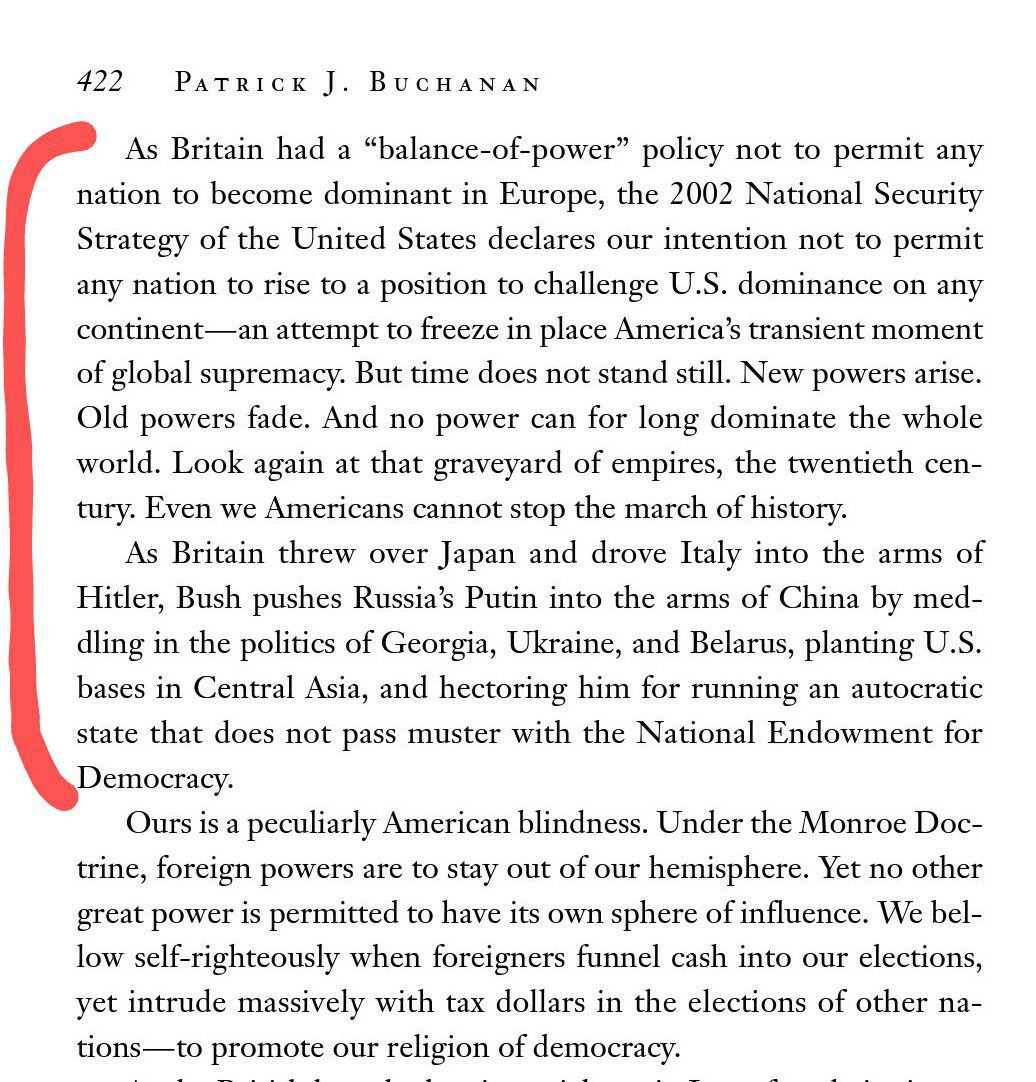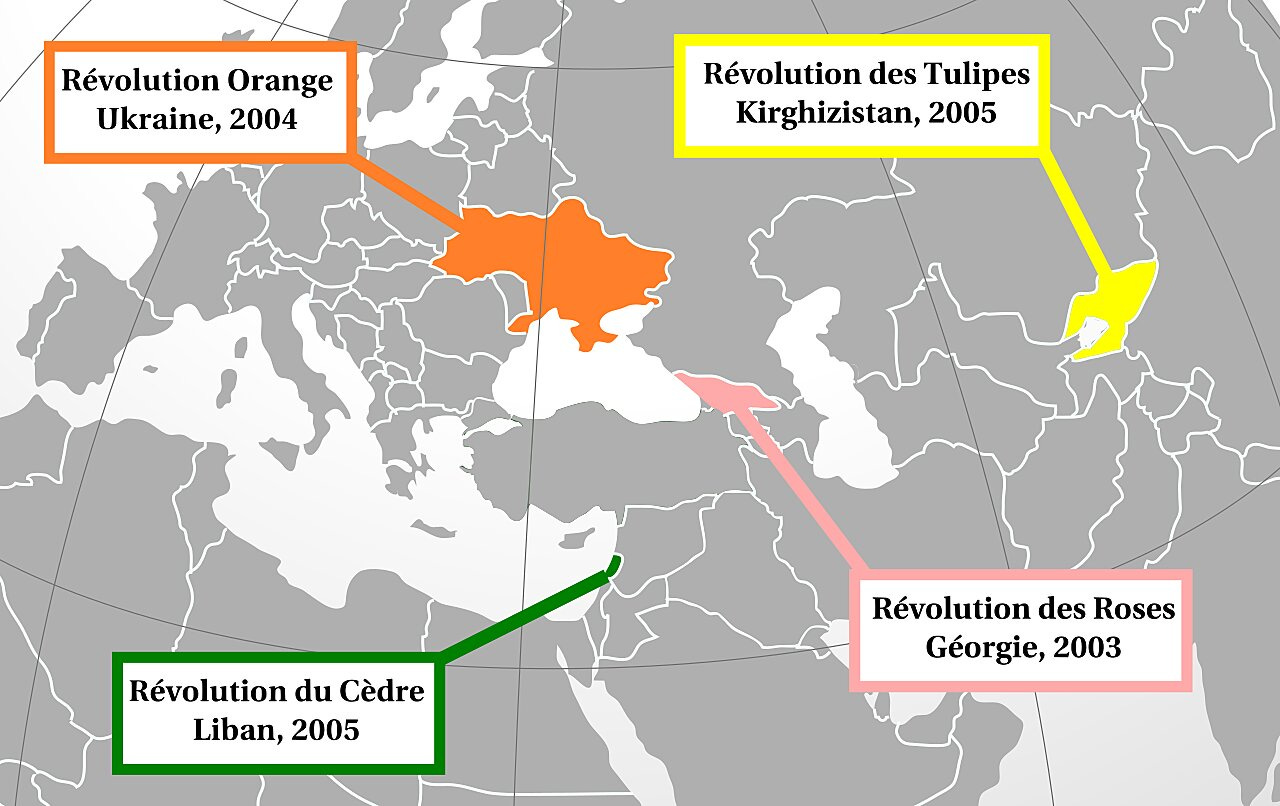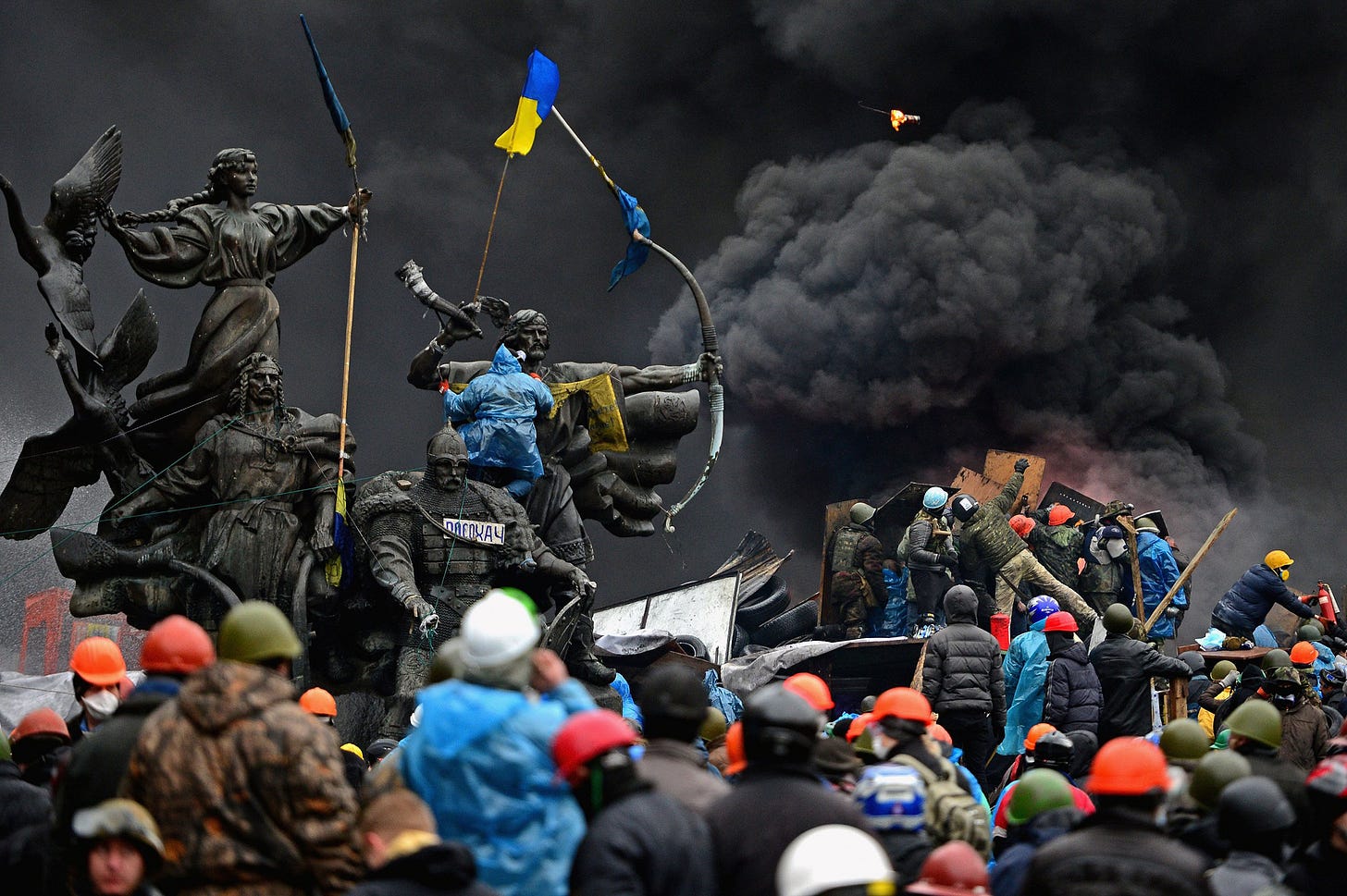Ukraine, Encroachment, and Rapprochement
What thirty years of "end of history" does to a motherfucker
It seems that everyone is talking about Ukraine, and I have had the rock I am trying live under flipped over too many times being asked about it not to provide some thoughts on the matter. Will this suffice? Or will I have to do a stream on this one of these Sundays? I will offer some observations here, as to satiate the question as I have become the geopolitical frog of the lake. This isn’t too heavily researched, just some thoughts as we get a premise of the situation and some of the causes that got us here.
Cheek misanthropy aside, I wanted to start with this passage from Pat Buchanan, one of the few Americans we actually owe an apology to.
This is from his book, Churchill, Hitler, and the Unnecessary War, published in 2008. However the 2002 policy Mr. Buchanan writes about has an earlier thru-line that can be found in a 1992 paper from David Gompert in which you might find some familiar NatSec names (cough cough Wolfowitz cough.) Yet I find that year, 2008, keeps coming back when we talk about European affairs, and not just because some other guy wrote a book saying that a Flashpoint or something. But 2008 was, as George Friedman called it, the year where the worth of the American promise really began to be questioned. An assessment, despite his more hawkish attitudes, I agree with. So how did we get from here, to where we are now, blustering about by evacuating embassies while our European “allies” (I’m sure there is another word the Atlantic Council says behind closed doors) are keeping their embassy staff right where they are in Ukraine?
Liberal Hegemony and Post-USSR
What many call the, “Globalist American Empire” or, the big GAE, has its roots intrinsically linked to liberalism, and by extension whatever the logical conclusion of those ideals may be. G. John Ikenberry calls the United States the builder of a “liberal hegemonic order” since the end of the second world war. Barry Posen, International Relations scholar and author of the book Restraint: A New Foundation for US Grand Strategy, says that there is much consensus among your republican and democratic foreign policy makers (aside from a few isolationist lefties or paleoconservatives on the right) means that this has been the status quo for decades, something that is part and parcel of the policies that have emerged from AA’s Boomer Truth Regime.
But Posen calls this consensus, and the strategy that emerged as the de facto Grand Strategy for the GAE, “liberal hegemony.” The strategy being so infectious and hegemonic for the US Regime (I don’t identify with it, neither should you,) because it builds on existing great power advantages such as resources, geographic isolation, technology, etc., in order to promote and defend a set of values to ensure others cooperate or that there is overwhelming force prepared so that no one dares challenge it. However these values, (a cover for a political formula) gave way to a building block through NATO, the promotion of political systems, confederations, and idealism that would serve as an ideological counterweight and vanguard to the Cold War.
Yet 30 years ago, with the fall of the Soviet Union, there was a chance, for something different. Something more realistic. So while the regime was selling Aladdin and Agrabah while it was attacking Baghdad, four schools of thought began to emerge. The four were the following, which deserve another more detailed breakdown in their own post.
Cooperative Security
Primacy
Selective Engagement
Isolationism
Schools three and four were defeated within the establishment. The Paleocon Isolationism of Buchanan defeated (with some credit going to Roger Stone and Trump) while Selective Engagement was considered not up to par to the liberal framework that dangers could come from failed states, autocracy, and illiberal peer competitors. Primacy and Cooperative Security won out, and became permanently fused in after 9/11. Even after Obama’s “pivot to asia” or the regime’s focus on Taiwanese democracy, the USG allies with partners through economic and security pressures to ensure primacy in these key areas strategically.
This has been the ongoing grand strategy, to which even that hawkish Freidman pointed out in his book, The Next 100 Years. It is clear that for the last 20 years, but overall the last 30, this policy of liberal hegemony was not prepared in the slightest for the world it would create, and the hubris of its own beliefs.
Flaws, Fools, and Flights of Fancy
I cannot in good faith say that everyone within the foreign policy establishment, or was an expert working the regime were on board with this. In fact, any recent interview Jim Jatras has done is proof of this, and I am also arguing with the benefit of hindsight. Perhaps these few words (but I too am the opposite of terse ) can give credence to their critics of back when.
Liberalization Doesn’t Equate to Democratization
Something we saw a lot from the late 90s, which would emerge from everything to Democratic Peace Theory, and the liberal trend that liberalizing Chinese markets would lead to democratic revolution once the quality of life improved alongside the economy. Despite this concept arising into the likes of nation building, something which through a grand irony, George W. Bush campaigned against in 2000, but was promoted by everyone’s favorite Dark Lord in the UK. If ever these were the thoughts that somehow a freer market would lead to democratization - but wait, remember, these values are a mask for political formulas and state strategy. Between reserve currency, sanctions, and strategic deployment of the navy, the choice was liberalize, (and by extension subject one’s self to the international, rules based, i.e., power based order) to stick it out with a few other dissident nations. However, as we can see from both Russia and the Chinese, it doesn’t work all that well against civilizational states.
Civilizational States
The one major critique you will see levied against the neorealist perspective of international relations (a critique I agree with if you consider elite theory,) is the famous phrase from Alexander Wendt: “Anarchy is what a state makes of it.” In reference to the constructivist view that “norms” or “rules” are indeed social constructs in the international order based on how powers perceive them and how they present them on the world stage. I’ll be breaking down this concept in more detail later, but for now we should be taking this concept to the elites. If a nation’s elites view itself more as a values based system for capital, power, and their own interests over an ethnos, historical narrative or stock, it clashes against those who view themselves as something else.
Russia and China in my opinion are civilizational states. A civilizational is a country that represents not just a historical territory, ethnolinguistic group, or body of governance, but a unique civilization in its own right. Something that might sound familiar if you’ve read your Huntington. What is American civilization, for the sake of argument, if nothing more than a political formula of "Liberal, Democratic Values” which has reduced its military readiness, targeted the founding stock of the nation, and has witnessed its infrastructure and cities fall in the name of ever-marching progress? It’s hard to corrupt or push a nation around with views that are the opposite of this. China knows first hand from the experiences of 1989 and its “century of humiliation” to know what to expect, and has in fact taken advantage of the liberalization of its economy in order to set itself as an economic and strategic counterweight to the United States in its own initiatives.
Russia, at least within the Russian elite and Vladimir Putin, has set itself the same way. A reassertion of Russian power, and, as unfortunate as it has become, an ally to a civilizational rival. But I’ll touch back on this at the end.
Encroachment
The more things change….
The more they stay the same.
Color Revolution and Encroachment
The post-USSR World, in an age of US primacy and the ushering in of democratic victory, a confirmation bias of their own beliefs from the last great global conflict saw a rapid expansion of the North Atlantic Treaty Organization, NATO.
This doesn’t include the ongoing talks (talks that have been discussed for years now) about Ukraine joining NATO. But this is part of the strategy the USG pursued - prevent the rise of another power, and move Eastward for containment and to keep Western Europe aligned with USG/NATO. This can be seen recently with American attempts (successful so far) at delaying the Nord Stream 2 Pipeline.
However one might also consider forming a bloc to the newly formed Commonwealth of Independent States, many of whom are members of the Eurasian Economic Union, and the Collective Security Treaty Organization. These nations include Armenia, Azerbaijan, Belarus, Georgia, Kazakhstan, Kyrgyzstan, Moldova, Russia, Tajikistan, Turkmenistan, Ukraine, and Uzbekistan. Keep in mind ongoing conflicts, unrest, and terror in those nations when thinking about the larger picture, but more on that for another time.
So, about that tragedy of civilizational states? American primacy, preventing energy from flowing into the West, (Ukraine did this over transit fees did this back in ‘09, a big reason for the pipelines to begin with) sanctions, color revolutions and more. Simply pushed the Russians to China, while both watched the Americans fight in the graveyard of empires. Economics, one of the core tenets of the traditional term soft power allowed both states to put themselves up to challenge the Ancien Régime of Pax Americana. Which it didn’t have to be this way. In fact, the obvious was said earlier this week. Vice admiral Kay-Achim Schoenbach, of the German Navy, speaking in New Dehli last week, some of the following comments were made in a Q&A.
“Having this big country, even if it is not a democracy, as a bilateral partner … probably keeps Russia away from China.” The Admiral, describing himself as “a very radical Roman Catholic”, Schönbach said Russia was also a “Christian country, even if Putin is an atheist, it doesn’t matter”. Of course, Germany remains in a complicated position, it has not yet delivered arms to Ukraine, yet has withheld NS2 finalization in support of the cause (and American pressure.) Federal Foreign Minister Annalena Baerbock (Greens), toeing a fine line, has also said that Germany "does not want to contribute to further uncertainty in the situation.”
The consequences of encroachment and color revolution in effort of containment are the following:
Weakening relations between whatever European allies you do have, especially the most prosperous economy on the continent.
Push Russia successfully away from the United States, whom the two would have served as an effective bloc against Chinese ascension.
Weaken US position and leave it overstretched, underprepared, with fewer and fewer nations to rely on for cooperative security.
The era of American Primacy policy is dead. Or at least it should be. This will not stop the regime in thinking that its Lana Del Rey quoting military can win wars; which it can, and just like with Afghanistan, if war were to break out know that it will be straight white Christian men dying for that rainbow flag.
Rapprochement
I cannot say with any certainty that the ongoing buildup in Ukraine, Belarus, and in the Baltic Sea will lead to any significant, hot kinetic conflict. It is highly unlikely in my opinion, as the current ability for troop deployments on the West do not meet the ability to meet Russian force projection. Perspectives on war depend on how you wish to take it analytically. The rationalists might play this out via their bargaining models of war to assume when the game of chicken here might end; while there are some of you reading this just wanting something to happen.
However, as the concept of the security dilemma tells us, that without communication or the appropriate perception of how one state actor might respond or act with one’s weapons, more will escalate. A few streams ago I had mentioned in passing about NATO expansion and Ukraine. To the few Russians I know and have talked to, the principle concern was the repeat of the “Caribbean Crisis” or what’s known by us Americans as The Cuban Missile Crisis. Which is repeating itself before our very eyes even if rhetoric. But it does illustrate the strategic importance of Ukraine compared to US sovereignty concerns over Cuba.
Which brings me to the final piece of advice I would give to any sane fool thinking that they can steer the ship around anywhere in the state department. Yes. You. The one poor dumb bastard who thinks he’s making a difference. Here’s what you do, and this is a keystone of any foreign policy of the next American regime.
Strategic and gradual withdrawal of American and NATO forces along Poland and Ukraine, where a majority of Russian Forces are deployed vis a vis Belarus and Russia. An acknowledgement that Crimean peninsula is not going to be leaving Russian hands anytime soon. (It wasn’t ever going to after annexation, so just admit the obvious.) Reengage Russia with an actual reset rather than some big dumb button akin to Hillary. You won’t Sino-Soviet Split 2: Electric Boogaloo tomorrow but it’s one hell of a start.
The Nomos of the Earth in the 21st Century is predicated on a multipolar world order. In a discussion of nuclear weapons during the cold war, International Relations Scholar Kenneth Waltz argued that bipolarity was better than a unipolar situation on the dominance of nuclear power and global stability. I wish to appropriate this on the world stage. If the clash of civilizations is going to be a the way it is projected to be with a Chinese state, even if perceived to be by our elites, it would be preferably for the next regime to engage in a bipolar framework than a Han Unipolar one.
But as I write this, it is getting late.
I hope this satiates some desire for me to opine on this; I’ll be off now.








